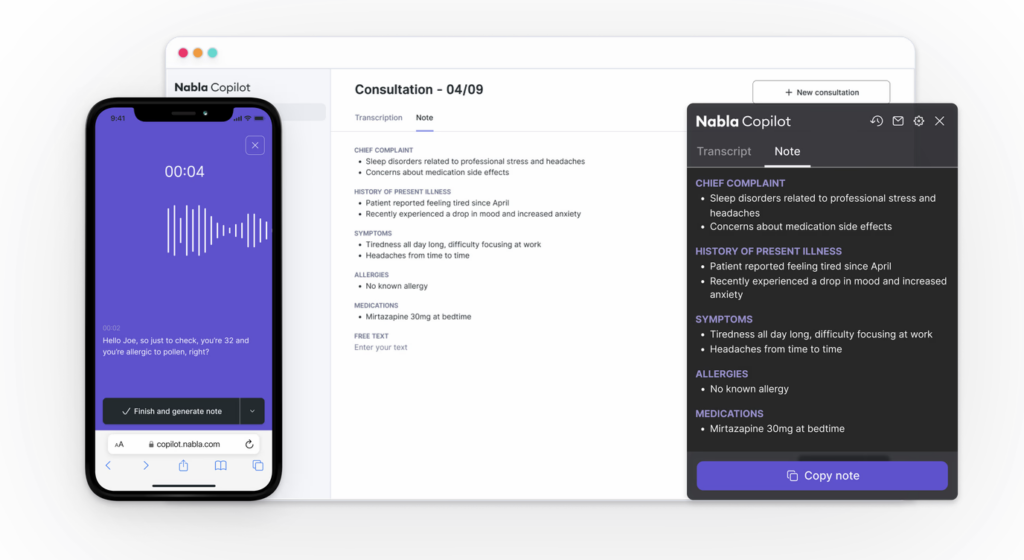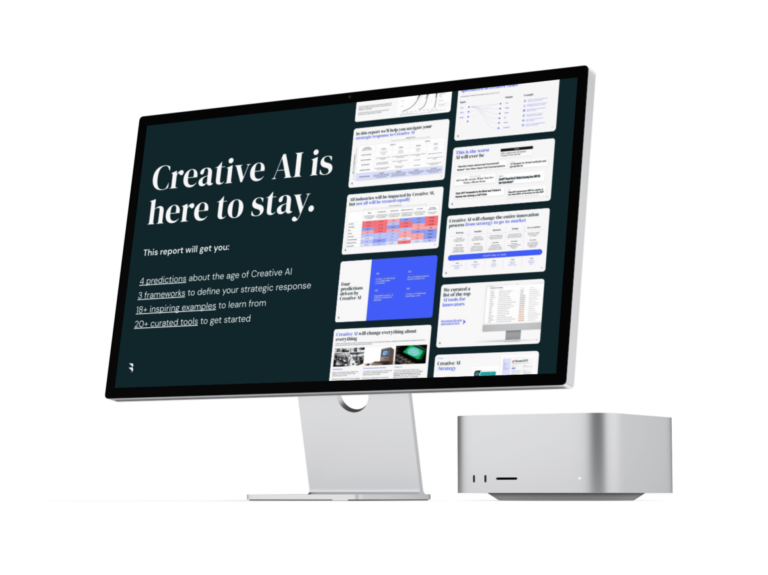5 ways Generative AI is reshaping Healthcare decision making

Co-Founder and COO at Visium
Principal Innovation Consultant
Business Director Healthcare
- 1. Virtual Empowerment: AI-Enhanced Virtual Consultations
- 2. Precision Care Pathways: Tailored Treatment Plans with Generative AI
- 3. Intelligent Insights: NLP-Driven Clinical Narratives
- 4. Proactive Health Monitoring: AI-Driven IoT Insights
- 5. Imaging Solutions: AI-Enhanced Medical Imaging Interpretation
- Conclusion
Harnessing GenAI for data-driven healthcare decisions, from personalized treatment plans to virtual consultations.
In the dynamic landscape of healthcare, Generative AI has emerged as a game-changer for data-driven decision-making. When paired with a thoughtful data & AI strategy, this cutting-edge technology has the potential to revolutionize many processes for healthcare providers, payors, and patients.
Concrete examples harness the power of generative models to analyze patient data and create personalized treatment plans, provide real-time medical advice, extract clinical insights, monitor health remotely, and enhance medical imaging interpretation. In this blog post, we’ll dive into five groundbreaking Generative AI use cases that are revolutionizing decision-making in healthcare.
Each case will be explored from both a business and technical perspective, shedding light on why it holds a crucial place in the industry.
1. Virtual Empowerment: AI-Enhanced Virtual Consultations
Generative AI-driven virtual consultations utilize patient data and AI algorithms to provide personalized, real-time medical advice, enhancing accessibility and convenience.
Example: Teladoc.
Business rationale
- Virtual consultations improve patient access to healthcare, particularly for those in remote or underserved areas.
- Enhances patient satisfaction by providing on-demand, personalized medical advice coupled with human interaction.
- Reduces costs associated with in-person visits and enhances the overall patient experience.
Technical considerations
- Generative AI algorithms analyze patient information in real-time, providing immediate and post-hoc recommendations during virtual consultations.
- Encryption protocols ensure the confidentiality and privacy of patient information during virtual consultations.
- Integration of off-the-shelf AI components in telemedicine applications is underway.
2. Precision Care Pathways: Tailored Treatment Plans with Generative AI
Specialized Medical Large Language Models (LLMs) will create customized treatment plans by analyzing individual patient data, including medical history, genetic information, and lifestyle factors. This enables healthcare providers to deliver targeted and effective care while focusing on the patients.
Example: Google Med-PaLM
Business rationale
- Personalized treatment plans lead to improved patient outcomes and higher satisfaction rates.
- Reduces timely elaboration of personalized treatment plans and trial-and-error approaches to treatment, resulting in significant cost savings.
- Establishes healthcare providers as leaders in the field of personalized care, enhancing reputation and attracting more patients.
Technical considerations
- Multimodal LLMs such as Med-PaLM2 will be employed to generate patient-specific treatment recommendations to be validated by medical doctors.
- Robust model evaluation is essential to ensure accurate and meaningful treatment suggestions.
- Integration with Electronic Health Records (EHRs) and other data sources is crucial for comprehensive patient profiling.
3. Intelligent Insights: NLP-Driven Clinical Narratives
Generative AI-powered Natural Language Processing (NLP) processes unstructured clinical data to extract valuable insights, enabling healthcare providers to focus on care while making data-driven decisions.
Examples: Nabla, Abridge, Suki
Business rationale
- NLP streamlines clinical documentation, reducing administrative burden and improving billing efficiency.
- Enables healthcare providers to focus more on patient care by automating time-consuming documentation tasks.
- Enhances revenue generation by improving billing accuracy and reducing compliance risks.
Technical considerations
- Advances in speech-to-text technology allows for easy and accurate information extraction.
- LLMs’ spectacular understanding abilities enable the analysis and extraction of information from the obtained text data, generating structured, actionable insights.
- Integration with Electronic Health Records (EHRs) ensures seamless incorporation of structured clinical insights.

4. Proactive Health Monitoring: AI-Driven IoT Insights
Generative AI enhances IoT-driven remote monitoring by analyzing real-time patient data to provide personalized insights and intervention recommendations.
Example: Whoop Coach, powered by OpenAI
Business rationale
- Improves patient engagement and empowerment through personalized, real-time health insights.
- Leads to early intervention, reducing hospital admissions and associated costs.
- Provides a competitive edge in the market by offering advanced, data-driven remote monitoring services.
Technical considerations
- Generative AI algorithms analyze real-time health data from IoT-enabled devices, generating actionable insights for better patient care.
- Leverages continuous learning techniques to improve recommendations based on population-level learnings observed across users.
- Implements encryption and secure data transmission protocols to protect the integrity and confidentiality of patient information.
5. Imaging Solutions: AI-Enhanced Medical Imaging Interpretation
Generative AI revolutionizes medical imaging interpretation by providing enhanced insights and diagnostic support, aiding healthcare providers in making accurate assessments.
Business rationale
- Improves diagnostic accuracy and reduces the likelihood of misinterpretations in medical imaging.
- Enhances patient trust through more reproducible and precise imaging results.
- Positions healthcare providers as leaders in advanced diagnostic capabilities, attracting more referrals.
Technical considerations
- Validated deep learning algorithms to diagnose pathologies have been around for some time.
- Generative AI algorithms can, on top of precise diagnosis, analyze medical images with further context, enhancing details and providing additional insights for better diagnosis.
- Integration with Picture Archiving and Communication Systems (PACS) streamlines the incorporation of AI-generated insights into existing workflows.

A monumental shift towards precision, efficiency and patient-centric care
The integration of Generative AI technologies into healthcare decision-making represents a monumental shift towards precision, efficiency, and patient-centered care.
Precision Care Pathways, Virtual Empowerment, Intelligent Insights, Proactive Health Monitoring, Creative Imaging Solutions, and Advanced Medical Imaging Interpretation empowered by Generative AI are at the forefront of this transformative wave.
Understanding their business and technical implications empowers healthcare providers to unlock their full potential, driving positive outcomes for patients and organizations alike.
Transforming this understanding into a concrete action plan requires incorporating strategy, architecture, and implementation considerations. Embracing these advancements is not only a strategic move but also a critical step towards a more sustainable and innovative healthcare future.
Reach out to us and let’s have a chat about how your business can leverage the power of generative AI in healthcare.


